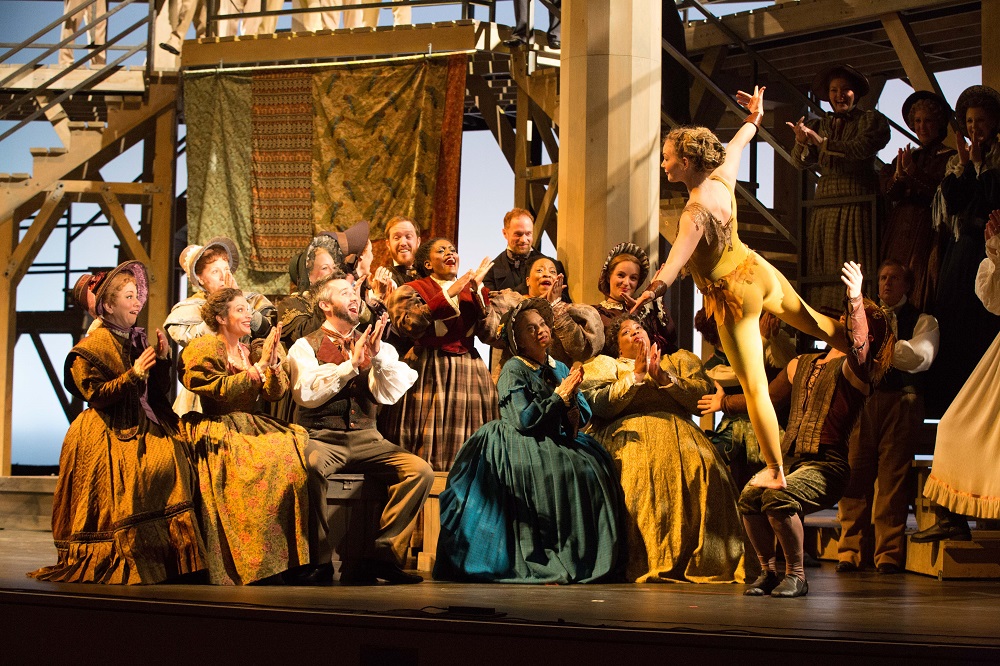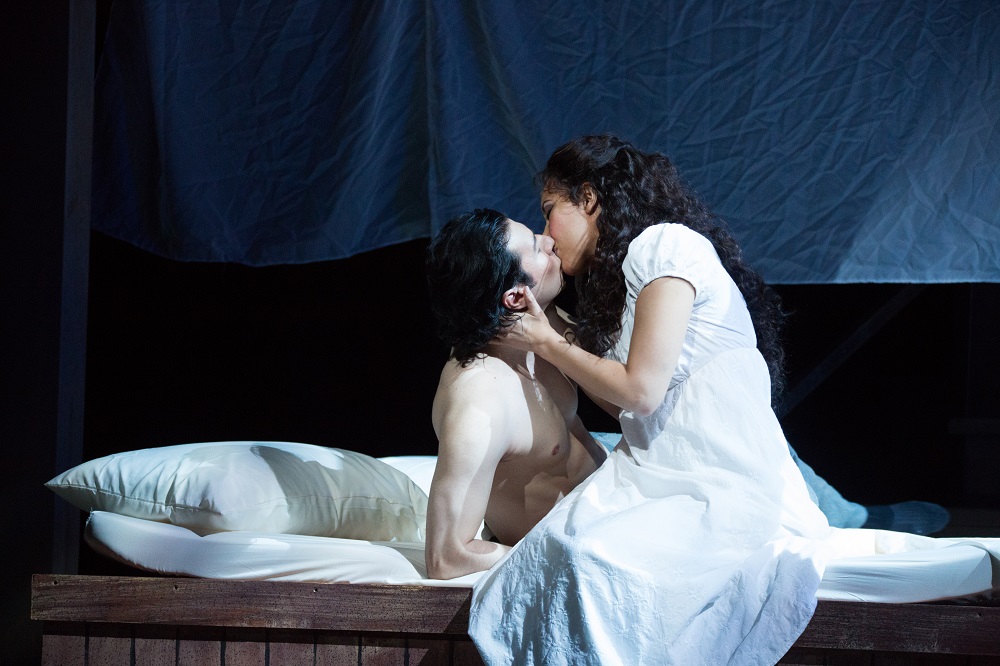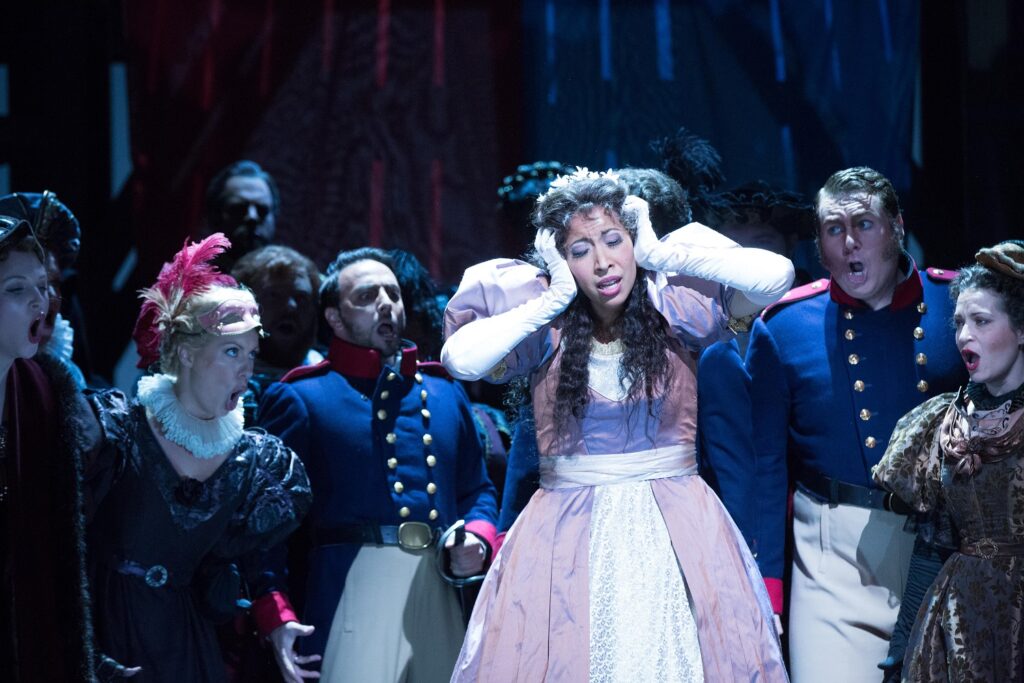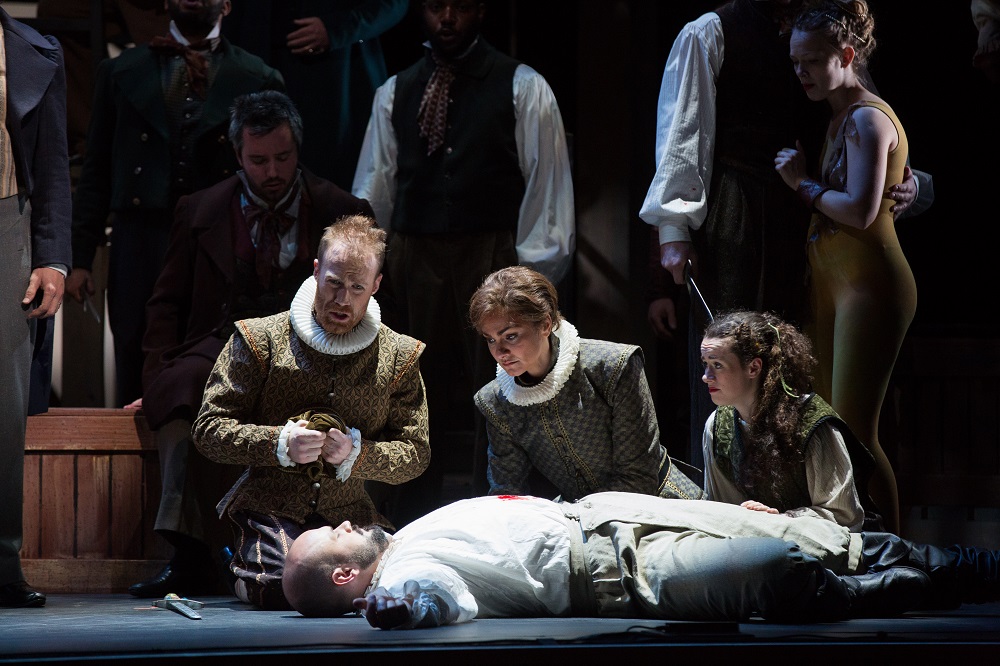To close its 2015-16 season, The Atlanta Opera tipped its hat to French Grand opera and unveiled a star-studded production of Gounod’s Romeo et Juliette this past Saturday. While all opera is dependent on singers of not only extraordinary technical pedigree but also of a musical understanding of how language informs declamation, Grand French opera relies on the latter more heavily so, making Romeo et Juliette notoriously difficult to cast. The Atlanta Opera’s first production, which hailed back in 2007, is fondly remembered as an uneven yet valiant effort at revealing the work’s hidden charms. The company’s current effort shares a similar evaluation.
For this production, the vision of General Artistic and Stage director Tomer Zvulun provided an ambition setting for the development of the drama, yet also served as a constant distraction. To his credit, the video projection element which has been the hallmark of his previous work was not featured this time. Instead, the bulk of the set piece, designed by John Conklin, comprised of platforms, stairs, and open planks in a deliberate attempt to recreate London’s Globe theater. Furthermore, in two isolated scenes, stagings of “A Midsummer Night’s Dream” and “Death and the Maiden” (Schubert’s? Dorfman’s?) implied London as the opera’s true setting rather than fair Verona. This in itself proved an efficient method of presentation, allowing for greater variety of placement for the chorus and principals, as well as paying homage to the great playwright within the same stroke. But Mr. Zvulun has gone further in his acknowledgements, and through the work of his gifted costume designer Joanna Schmink, has set the dial on the costumes back to the mid-19th century, to reflect (we assume) the time of the opera’s premiere. How this brings new life to the work, as alluded in the production notes, is never quite explained, but the unintended effect is a bit like Great Expectations in French and allegedly set in Verona, and gave the entire affair a feeling of being overproduced. To put it things in greater perspective, these peculiarities of the production values were perhaps not so much problematic as they were generally aggravating, and at worst something to be dismissed with relative ease.

The greater business of music making held its own set of caveats. While the always excellent Atlanta Opera chorus achieved some of its most impressive work to date under its chorus master Walter Huff, the leadership of conductor Arthur Fagen was at times inspired but mostly inconsistent. In many instances, his baton worked the forces of the Atlanta Opera Orchestra into quite a frenzied state (The opera’s overture and prologue, as well as the opening of the forth act were beautifully realized without much over-romanticizing) . Yet the more complex set pieces, such as the opera’s crowd scenes (in particular the finale of the third act) suffered from a muddled texture, and individual numbers lacked buoyancy. Calling out maestro Fagen’s tentative pacing is at this point has become a matter of observation rather than a complaint, but as his tenure with the Atlanta Opera continues, a troubling inflexibility with the singers onstage is beginning to make itself noted. Nowhere was this more evident than during the lover’s bedroom scene in Act IV, where an already awkward stage business was further aggravated by the tenor’s inability to take his eyes off the baton, keeping him from building a connection with his pretty co-star. We hope this to be a passing side note as the company grows its repertoire and restores a fourth production to its season offerings next year.
The proclivities of the French heroic tenor have increasingly faded the fach into a mere footnote in the annals of operatic lore. The voice must lie somewhere between Ottavio and Lohengrin, brightly colored yet weighty, and its possessor must be capable of phrasing the text musically within the bounds of the French tradition. For all intents and purposes, this type of singer no longer exists, and it would be unfair to hold this state of affairs against tenor Jesus Leon. The young Mexican artist made a winning impression as Romeo on Saturday night, which also marked his debut with the Atlanta Opera, yet this was made the more remarkable by the fact that, stacked against the requirements, his impersonation tallied remarkably incomplete. Despite being endowed with a honeyed voice, Mr. Leon’s tenor is slender, produced in an overtly forward manner and underpowered at the bottom of its scale. Thus, he lacked the tools to project a passionate and brooding Romeo, a serious demerit that diminished his declamation as miniature during the frenetic duel and the proclamation of exile in Act III (“Ah! Jour de deuil et d’honneur et d’alarmes”). More telling was the puzzling effect of his act two aria, “Ah levez-toi, soleil”, which found the artist managing the score efficiently but not quite riding the orchestral waves and spilling over the footlights. Still, Mr. Leon was unwilling to be dismissed, and he earned back credits by banking in the careful modulation of his sweet instrument in the more intimate moments afforded by the four duets with his leading lady. Here, the delicate characteristics of his song found a happier medium, finding its greatest expression as he wrestled his farewells in Juliette’s bedroom (“Ah! Reste! Reste encore dans mes bras enlaces” made a lasting effect) and at the tomb of his beloved (a touching “O ma femme! O ma bien aimee” in the opera’s final scene). Thus it was through his shaping of the text, admittedly often hampered by a rather mannered diction, that Mr. Leon’s Romeo ultimately earned admiration, in addition to a well-deserved ovation.

His Juliette, soprano Nicole Cabell, exhibited essentially the other side of the coin. Whereas Mr. Leon’s Romeo was nuanced and delicate, Ms. Cabell’s Juliette was reliable, sturdy, and somewhat distant.. Though it’s a gleaming and sultry instrument, her soprano is not the most idiomatic vehicle for Juliette, and is more likely better suited for Bellini’s version for which Ms. Cabell has already earned superlative notices. Her singing was even throughout, and recollection of her fine debut as Pamina at the Atlanta Opera in 2010 reveal no apparent deterioration in her scale ever since. Yet, her voice remained veiled throughout the evening, attaining a necessary brightness only at the extreme top and consistently keeping her diction guarded from the ears of the listener. This tendency held back her work during the first two acts of the opera, where the singer is expected to win over the hearts by way of a girlish charm which never materialized, and instead yielded something altogether more mature. Her handling of the famous waltz, “Je veux vivre”, was efficient yet heavy handed, and while her contributions in the opera’s first half were anchored mostly by her virtues as a fine singer (no mean feat in this difficult part), the overall impression was less than becoming. This would change as the evening proceeded to its latter half, as it became evident that Ms Cabell was much more attuned to passages of heightened drama as hinted back in Act I when her voice took on a foreboding quality for “Ah! Je l’ai vu trop tot sans le connaitre!” Following the romantic duet which opens Act IV, she became quite alert and poised as she embarked in the often omitted “Amour, ranime mon courage” (we wonder if she was engaged specifically to deliver this bravura showpiece) which her instrument filled out in an exuberant and animated fashion. Thus her appeal was of a blunter nature, and when joining forces with Mr. Leon, it became rather curious that these two quite disparate voices would complement one another so well as to rank their four duets, the basic core of the opera, a success.

The secondary characters were luxuriously cast, and were spearheaded by the Mercutio of Edward Parks, whose gossamer baritone was already heard on this stage two years ago in another French vehicle, Valentine in Gounod’s Faust. Here, as it was the case in 2014, his voice seemed thoroughly suited to the role in both range and style and gave evidence to the fact in his deceptively difficult tribute to Queen Mab. Across the battle lines, his archrival Tybalt was also handsomely realized by the alert and incisive tenor of Santiago Ballerini, whose ardent singing even put Mr. Leon on notice during their heated exchanges in act III. Looming helplessly over his household was the Capulet of baritone David Crawford, who reportedly joined the cast at the eleventh hour and exhibited a solid instrument.
The Stephano of mezzo-soprano Sandra Piques Eddy was quite at home projecting the physique du role of a young saucy lad, and lent an imposing sound to his ditty “Que fais-tu, blanche tourterelle”. It must be noted that the singer’s tone has begun to show a light tendency to droop downwards, but we hope this was a function of the limitations of the part. Completing what must have felt like a sort of reunion from the Atlanta Opera’s 2013 production of Rossini’s L’Italiana in Algeri, she was joined by bass Burak Bilgili, who sadly added his name to the long list of victims who have fallen prey to the thankless part of Friar Laurence. Baritone Nicholsa Yaquinto provided the requisite eye candy for Paris, and Cory Neal Schantz’s Duke was uneven and undernourished. Jonathan L. B. Spuhler and Alan Higgs’ Gregorio did well by Benvolio and Gregorio respectively, while Cindy Sadler was a fruity and appropriately matronly Gertrude.

Three performances of the Atlanta Opera’s production of Gounod’s Romeo et Juliette remain in the calendar. For tickets and more information, please visit the company’s website at www.atlantaopera.org
-Daniel Vasquez